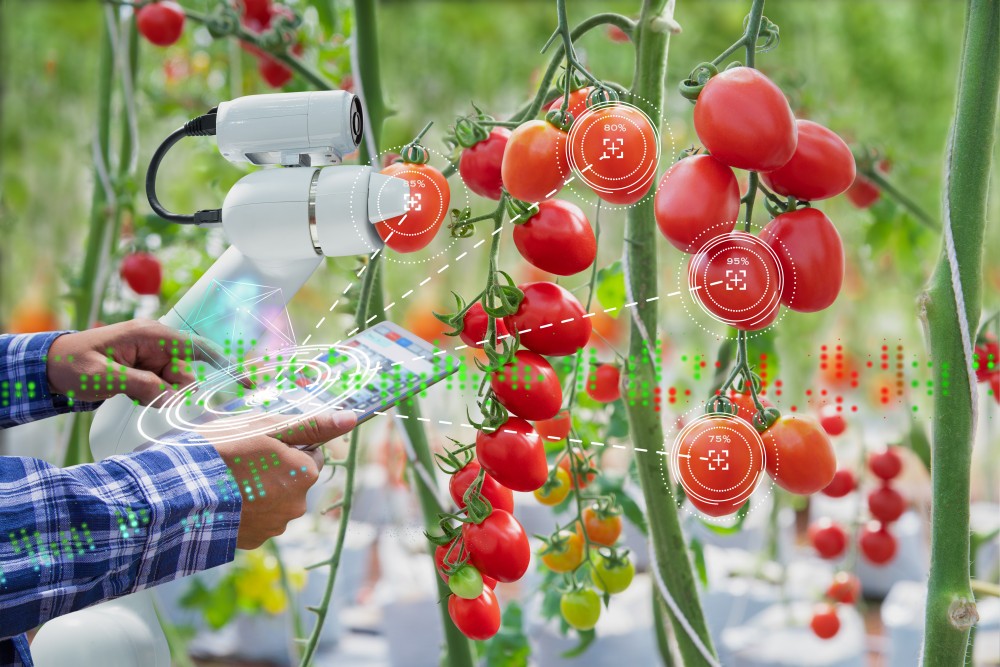A GMV-led consortium drives research into the application of AI in the agrifood production chain

The consortium of 24 public-private organizations led by GMV within the framework of the Digital Spain Agenda 2025 and the National Artificial Intelligence Strategy, is setting up the AgrarIA project with the ambitious aim of investigating the applicability and viability of artificial intelligence (AI) together with other Industry 4.0-related technologies in real solutions to define new agricultural production methods that will make Spain’s agrifood sector more technological, innovative, sustainable and committed to energy efficiency and carbon footprint reduction in the future.
The project is funded through the R&D Missions in Artificial Intelligence Program of the State Secretariat for Digitalization and Artificial Intelligence (SEDIA) of the Ministry of Economic Affairs and Digital Transformation (File No. MIA.2021.M01.0004), corresponding to the funds of the Recovery, Resilience and Transformation Plan. The scope of the project focuses on two strategic lines for the future development of the sector, on the one hand on research in the complete value chain of agricultural production through systems governed by artificial intelligence with the objectives of drastic reduction of carbon dioxide (CO2), sustainability, energy efficiency and improvement of productivity and competitiveness. On the other hand, in research on the application of the use of different technologies and artificial intelligence in the most efficient and carbon neutral way.
The project contemplates the development of the AgrarIA platform where all the models and components required in the value chain of the agricultural sector—production, transformation and distribution—can be integrated in a single decoupled computing entity and in a standard way, allowing the definition of process flows that are integrated with AI technologies necessary for their development, as well as other digital enabling technologies to deploy unique initiatives or specific use cases that favor a fast, efficient, productive and sustainable transformation of the sector in the medium term. Among others, we find solutions ranging from the development of new natural products for pest and disease control that maintain the same effectiveness as those of chemical synthesis and provide a real solution to the production constraints that Farm to Fork and the Green Deal entail for farmers, to the use of collaborative robotics to optimize the processing phase of the products. In addition to research using quantum computing in the management of satellite images to optimize agricultural production or the application of digital twins for the energy efficiency of refrigeration plants.
Thus, the main research lies in the potential use of the different applications of AI to real and representative use cases of the agri-food sector, based on various mechanisms of interoperability, data governance, cybersecurity, storage, computation and consumption of intelligent information that may be in external platforms or accessible services. To this end, AgrarIA will have a modular and integrated architecture with already developed and proven solutions that have their own roadmap to evolve and compete in their respective markets. On the other hand, thanks to the modeling of the solution as a platform, it will be possible to accommodate the specific needs of the production processes in the most efficient and secure way, taking advantage of the synergies that may exist and interacting with productive external elements to model initiatives with a varied complexity and heterogeneity with the different partners and end users.
Radiography of the Spanish agri-food sector
The Spanish agri-food sector is made up of some 900,000 farms and more than 31,000 food companies, of which more than 95% are SMEs, with 80% of the companies having less than 10 workers. It has an export potential of more than 50 billion euros, its contribution to the creation of wealth and employment is estimated at 2.6 million jobs, and its direct relationship with the success of other sectors such as tourism and the service sector makes it a strategic sector for our economy. However, despite these data, it is a sector with a very low level of digitalization compared to that of other countries, which is why it requires a transformation of its production model. AI is one of the digital technologies with the greatest capacity for exponential transformation and, although it has been with us for more than 60 years, it has not been until the last decade that we have seen the greatest growth in its application, thanks to cloud computing, parallel computing and the birth, at the hands of large multinationals, of frameworks for the modeling and development of AI systems.
In this context, the AgrarIA project will be able to contribute significant value to the generation of relevant changes in the socioeconomic structure of Spain through the intensive use of AI, strengthening competitiveness through various R&D activities throughout the project related not only to AI, but to practically all digital enabling technologies, thus enabling not only the development of new business models, but also the transformation of the agricultural sector, making it more productive, efficient and sustainable.
Consortium of participating companies in alphabetical order:
- 1A INGENIEROS, S.L.P.
- AGENCIA ESTATAL CONSEJO SUPERIOR DE INVESTIGACIONES CIENTIFICAS
- AGERPIX
- CASA AMETLLER S.L. (GRUPO AMETLLER ORIGEN)
- Celtiberian Solutions S.L.
- CODESIAN SOFTWARE TECH S.L.
- DRONETOOLS, S.L.
- Emergya Grupo
- FAMILIA TORRES
- FLORETTE IBÉRICA, S.L.
- GMV
- HelixNorth (Lanzadera Digital S.L.)
- HISPATEC
- INSTITUTO TECNOLÓGICO DE CASTILLA Y LEÓN (ITCL)
- Inteligencia Solagua, S.L.
- KIMITEC
- KIVNON LOGISTICA S.L.
- LB-BAGGING, S.L.
- PRIMAFRIO S.L.
- Secmotic Innovation S.L.
- Sylentis S.A.
- TEPRO Consultores Agrícolas S.L
- University of Salamanca
- University of Seville - Department of Physical Geography and Regional Geographic Analysis
The AGRARIA Project: ARTIFICIAL INTELLIGENCE APPLIED TO THE VALUE CHAIN OF AGRICULTURAL PRODUCTION 2050 (TSI-100114-2021-1), has been funded by the Ministry for Digital Transformation and Civil Service, through the 2021 Artificial Intelligence R&D Missions Program, within the framework of the Spain Digital Agenda 2025 and the National Artificial Intelligence Strategy, with European funding through the Recovery, Transformation and Resilience Plan.
